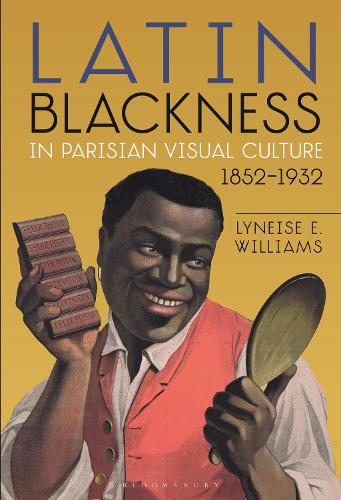
Latin Blackness in Parisian Visual Culture, 1852-1932
(Hardback)
Available Formats
Publishing Details
Latin Blackness in Parisian Visual Culture, 1852-1932
By (Author) Dr. Lyneise E. Williams
Bloomsbury Publishing PLC
Bloomsbury Visual Arts
21st February 2019
United Kingdom
Classifications
Tertiary Education
Non Fiction
Human figures depicted in the arts
704.036804463109034
Physical Properties
Hardback
232
Width 156mm, Height 234mm, Spine 20mm
660g
Description
Latin Blackness in Parisian Visual Culture, 1852-1932 examines an understudied visual language used to portray Latin Americans in mid-19th to early 20th-century Parisian popular visual media. The term Latinize is introduced to connect Frances early 19th-century endeavors to create Latin America, an expansion of the French empire into the Latin-language based Spanish and Portuguese Americas, to its perception of this population. Latin-American elites traveler to Paris in the 1840s from their newly independent nations were denigrated in representations rather than depicted as equals in a developing global economy. Darkened skin, etched onto images of Latin Americans of European descent mitigated their ability to claim the privileges of their ancestral heritage. Whitened skin, among other codes, imposed on turn-of-the-20th-century Black Latin Americans in Paris tempered their Blackness and rendered them relatively assimilatable compared to colonial Africans, Blacks from the Caribbean, and African Americans. After identifying mid-to-late 19th-century Latinizing codes, the study focuses on shifts in latinizing visuality between 1890-1933 in three case studies: the depictions of popular Cuban circus entertainer Chocolat; representations of Panamanian World Bantamweight Champion boxer Alfonso Teofilo Brown; and paintings of Black Uruguayans executed by Pedro Figari, a Uruguayan artist, during his residence in Paris between 1925-1933.
Reviews
Latin Blackness in Parisian Visual Culture, 1852-1932 is intellectually ambitious, providing a clear, readable, and well-researched view of a subject almost completely missing from the art historical literature on Parisian modernism: the representation of Black Latin Americans. This book thus crucially adds to a vital literature within modernism studies that considers the relationship of French cultureroughly the center of the art world in the modernist periodto colonized Africa and the African Diaspora. Williams takes up complex subjects of race and racial categories with elegance and clarity, and her acute discussions of particular works anchor these more general discussions in visual immediacy. Starting with a highly engaging consideration of representations of Latinized Blackness, she establishes a clear baseline of assumptions about this hybrid groupand Latin Americans in generalin French popular culture and modernist art. * Patricia Leighten, Professor Emerita, Duke University, USA *
Author Bio
Lyneise E. Williams is Associate Professor of Art History at UNC Chapel Hill, USA.
